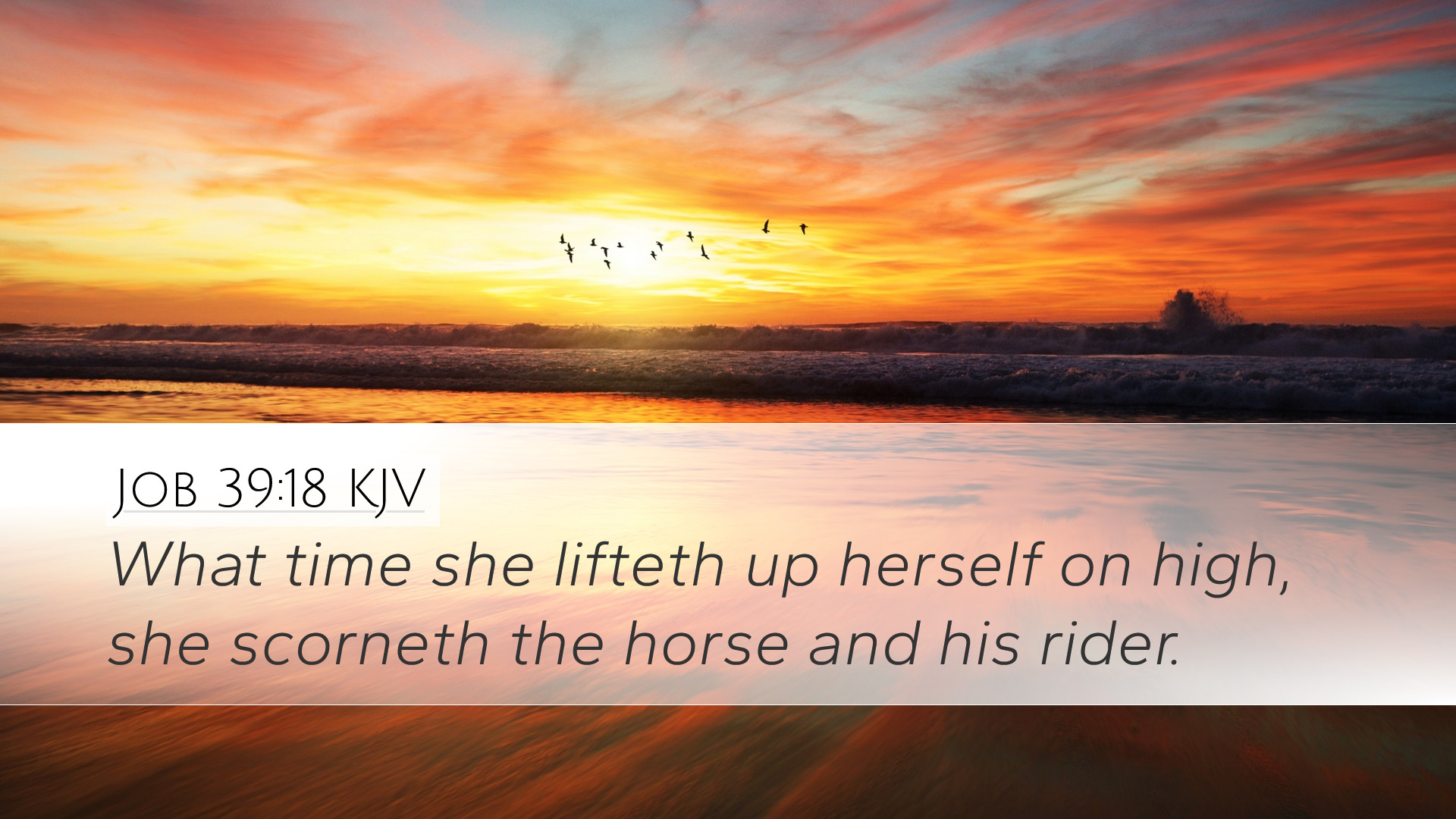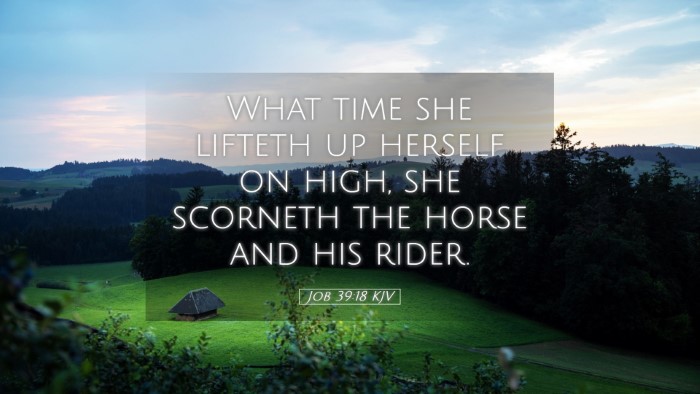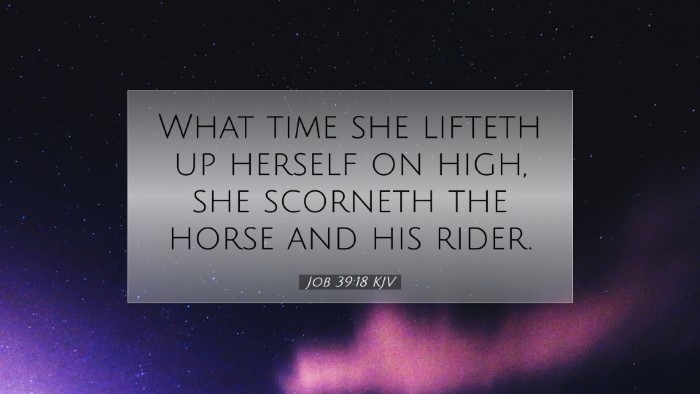Old Testament
Genesis Exodus Leviticus Numbers Deuteronomy Joshua Judges Ruth 1 Samuel 2 Samuel 1 Kings 2 Kings 1 Chronicles 2 Chronicles Ezra Nehemiah Esther Job Psalms Proverbs Ecclesiastes Song of Solomon Isaiah Jeremiah Lamentations Ezekiel Daniel Hosea Joel Amos Obadiah Jonah Micah Nahum Habakkuk Zephaniah Haggai Zechariah MalachiJob 39:18
Job 39:18 KJV
What time she lifteth up herself on high, she scorneth the horse and his rider.
Job 39:18 Bible Commentary
Commentary on Job 39:18
Verse: "What time she lifteth up herself on high, she scorneth the horse and his rider."
Introduction
The verse presents a vivid imagery of the ostrich, a remarkable bird that embodies both strength and a certain disregard for its surroundings. In this passage, God speaks to Job, affirming His creation and the unique qualities of animals, including their roles in the natural order. Commentators through the ages, such as Matthew Henry, Albert Barnes, and Adam Clarke, have offered profound insights into the layers of meaning contained within this verse.
Commentary Insights
1. The Nature of the Ostrich
Matthew Henry's Perspective: Henry remarks on the creature's ability to rise high and its indifference to the horse and its rider. He interprets the ostrich's behavior as a symbol of pride and a demonstration of the limits of human power and wisdom. The ostrich, although lacking in maternal instincts—which is unusual among birds—represents God's creative freedom and the diversity within His creation.
2. God's Sovereignty in Creation
Albert Barnes' Analysis: Barnes emphasizes that this passage illustrates God's sovereignty over all creation. The ostrich's ability to outmaneuver the horse—an animal traditionally associated with strength and speed—serves to underline God's omnipotence. Barnes notes that God's designs are often beyond human understanding, challenging our perceptions of what is powerful and important in the world.
3. Imagery and Symbolism
Adam Clarke's Interpretation: Clarke provides a detailed examination of the imagery. He suggests the ostrich's lifting up may symbolize ambition or pride, indicating a greater spiritual lesson regarding one's position before God. Clarke's commentary sheds light on the behavioral characteristics of the ostrich, which can be seen as a warning against arrogance and self-sufficiency. In this context, the ostrich's actions are a reminder to the beholder of the importance of humility.
Theological Implications
The phrase "scorneth the horse and his rider" prompts a discussion about pride and the human condition. The juxtaposition of the ostrich against the horse symbolizes the vulnerability of human endeavors in the face of divine creation. It serves as a humbling reminder of our limitations compared to the grand design of God's world.
Human Pride Versus Divine Humility
- The Paradox of Strength: Humans often measure success and power by physical or earthly means. This verse draws attention to a creature that embodies strength yet simultaneously represents a form of rebellion against those means.
- Invitation to Reflection: The passage invites us to consider how often we, much like the ostrich, may scorn the very elements we rely upon for strength—our abilities, resources, and connections—while forgetting our dependence on God.
Reflection for Pastors and Theologians
This verse offers rich material for pastoral teaching and theological reflection. It encourages leaders to admonish congregants regarding the dangers of pride and self-reliance, drawing parallels to the ostrich's behavior. When preaching from this text, one might emphasize the dual nature of God's creation—its beauty and its mystery, alongside the imperative of humility.
Applications for Study
- Speaker’s Note: Consider how the ostrich's proud bearing invites discussions around social humility in the church and community.
- Discussion Questions:
- What modern-day 'horses' and 'riders' do we scorn, and how can we recognize them in our lives?
- How can we cultivate a heart that values God's design over our assumptions of strength and capability?
Conclusion
Job 39:18 is a powerful testament to God's artistry in creation and the intricate balance between strength and humility. Scholars and pastors alike can draw from this verse to expound upon themes of divine sovereignty and the relationship between humanity and God's creation. By contemplating the ostrich's behavior, we are reminded to assess our own lives in the light of divine purpose and to remain humble before the creator.
As we engage with the text further, we are compelled to appreciate the wisdom inherent in God's creation, urging us toward a greater understanding of His ways and an acknowledgment of our place within His grand design.


